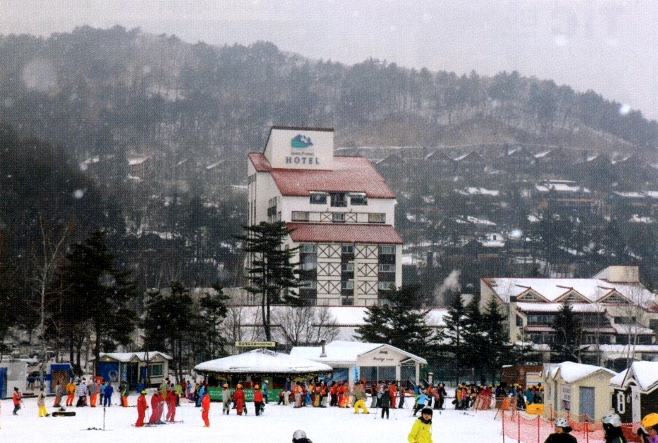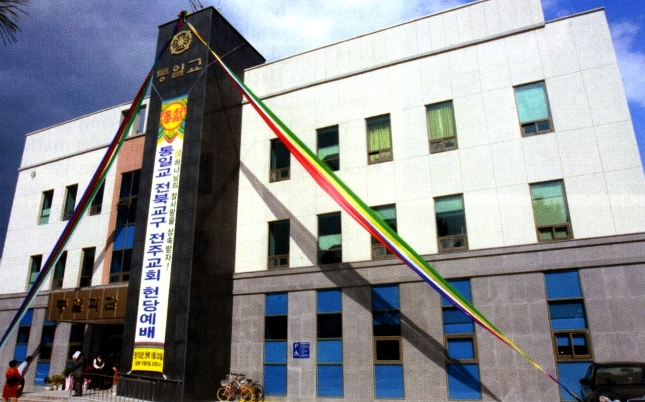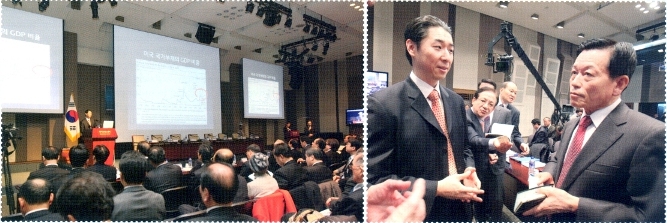![]()
The Words of Kook Jin Moon
|
|
The Words of Kook Jin Moon |

Though
not the main venue, Yongpyong Resort, a subsidiary company of the
Tongil Foundation, will host 2018 Winter Olympics events.
Early on I had the conviction that my homeland, Korea -- which at the time was suffering in poverty -- would become prosperous. Furthermore, it would become a nation that could share what it had with the rest of the world. It should be able to contribute spiritually and would also need a strong foundation of technical engineering skills. Therefore, I founded Tongil Heavy Industries some forty years ago. The company imported the most advanced automobile technology from German companies and thus laid the foundation for the automobile technology of modern-day Korea.
Perhaps in the 1990s I still imagined that our companies enjoyed failure-proof divine protection, because Tongil Heavy Industries' bankruptcy shocked me. I must have been naïve. In 1998, Korea was in the midst of a financial crisis that had already churned like a tornado through Thailand, the Philippines, Indonesia and Hong Kong. Hanbo Steel, flagship of the fourteenth largest business group (by asset size) was the first major bankruptcy I recall, in early 1997, after much effort to save it. A few months later KIA Motors, a famous car manufacturer, defaulted on loan repayments. The stock market and the value of Korean currency were in free fall. In November 1997, the Korean government applied for help from the International Monetary Fund. The IMF orchestrated a record setting 58 billion dollar bailout package. Korea used about 31 billion of it, and paid it back well ahead of schedule. To this day, Koreans refer to this dark period in their nation's modern history as the IMF era.
Tongil Heavy Industries was not our only church business essentially drowning in debt at that time. All the major companies under the Foundation to Support HSA-UWC were in the same predicament. This included Il Hwa Pharmaceuticals, founded in 1971, which most members are familiar with because of Il Hwa's ginseng extract. While Il Hwa was under what Koreans called "work out," I heard a retired head of the Food and Beverage Department for Lotte Department Stores, part of a multi-national Asian marketing giant, speak about how impressed he had been by Il Hwa products. He appreciated the taste of cider (a clear soft drink, like Sprite) which he said was made with especially pure spring water. He added that barley drink, McCol, had been wildly popular when the company first introduced it.
He described McCol's debut as a serious threat to Lotte and other competitors in the soft drinks market. Our church-related companies were not small, and despite their difficulties, they had made an impression on the South Korean public.
During the IMF era, it was said that the average debt-equity ratio of Korean private companies was dangerously high. This was caused, it was said, because companies affiliated with the major business groups were routinely able to borrow large sums from banks on the strength of their famous company name alone, without proving stability or offering collateral.
I asked Mr. Hun Choi, a leading CPA at the Tongil Foundation, whether our businesses failed because of something distinct with our business practices or were we simply following the same risky practices common to others "First, it was a good thing that it happened," he said, "because it shook up all the problems. When our economy got tighter, those companies were supposed to go away." This is the capitalism-without-bankruptcy-is-akin-to-Christianity-withouthell argument that we've become familiar with. We need the fear of failure to discipline our behavior. "You can't just look at the debt-equity ratio," he said. "When the economy is growing, companies can have a high debt ratio; when the economy slows down, they get into trouble. For our companies, it wasn't just a debt ratio problem. We had no profits. I'm sorry to say that we also found embezzlement. We need to consider why it happened."
While still in bankruptcy, Tongil Heavy Industries was sold in 2003 and the money paid for it was divided among its creditors. Il Hwa survives. In 2005, Father called in Kook Jin nim to take over the Tongil Foundation. After overhauling the Tongil Foundation staff itself, Kook Jin nim led the reconstituted foundation through an arduous, fraught process of restructuring the failing businesses. From twenty-seven companies in 2004 -- through consolidation, liquidation or sale -- thirteen companies remain. After thoroughly analyzing Il Hwa, one non-performing division of the company was jettisoned. Il Hwa turned a profit for the first time ever in 2006 and continues to be profitable. The company's future looks bright.

The
Tongil Foundation guides churches through the process of renovation
or construction of church buildings. This new church, in the city of
Jeonju about three hours south of Seoul, is decorated in honor of its
consecration service.
Kook Jin nim had first come to Korea to audit the companies here in 1992. He was fresh out of college, where he had majored in Economics and graduated with honors in June of that year. "Even the short time I spent in Korea back in '92 was a foundational period on which I could do my work in 2005," he said during an interview conducted on October 12. "In 1992, you could see many seeds of the problems we see today. There were many problems in the way the foundation chairman then was headed," he added.
A certain ethereal quality came through in the way he spoke about his visit to inspect the Korean businesses nearly two decades ago. He seemed aware of an otherworldly influence that had brought him to Korea, allowed him to gain an understanding of the existing problems and then guided him away again before those problems had been fully grappled with. After returning to America, he went on to earn a master of business administration degree (MBA) and to establish his own company, Kahr Arms, which manufactures defensive handguns. On why the time was not then ripe to extricate the church from its problems, he had this to say:
The only way you can understand it is in terms of the process of restoration and indemnity.... We had a small group of people paying indemnity and a small group causing the paying. Then, because Father announced the end of that time, those problems are now being turned right side up and being solved. There is a providential, historical time line as to why these difficulties are now being figured out.... There has been a lot of indemnity, a lot of suffering paid. There were some actors, whom if you look at how they were acting, weren't acting for the benefit of the public. The church had to run its course in order to get to a better place.
In preparing to write about the now-stable and increasingly healthy business foundation, I spoke with Mr. Jinnam Hwang, the director of the Administrative Support Department for the Tongil Foundation. The department he heads comprises an IT team, a financial team and a general affairs team. Jinnam Hwang is one of a number of second-generation members that was inspired to apply to work at the Tongil Group after the new chairman came. I had first seen him in the days when he would sometimes translate for Kook Jin nim.
I began by asking Mr. Hwang why only seven certified public accountants were listed among fifty-eight employees on the Tongil Group contact list. Since the business foundation manages a number of companies, I had expected more. He explained that the contact list covered only their headquarters and that CPAs also worked at offices within some of the affiliated companies.
This caused me to wonder what function a company president serves when the foundation headquarters is an overall management team. Wouldn't a president feel somewhat emasculated having the foundation always looking over his shoulder?
Mr. Hwang explained that some presidents did initially complain that they wanted to execute ideas without first having those ideas reviewed by the foundation's Planning Department. "But the president of each company should utilize the professionals in the planning team as in-house professional advisors," he said. "If they come up with great ideas, they should be able to get agreement from the professionals. That would be working to their full capacity."
The Planning Department doesn't vet every idea a company comes up with, only the major ones. "Any investment above $100,000 requires approval. For instance, approval would be needed if one of our subsidiary companies wanted to build an indoor water park," Mr. Hwang said.
I've seen posters advertising the water park, so I know that idea was approved and completed. Its part of Yongpyong Resort, an all-weather vacation destination whose winter sports facilities were a factor in the 2018 Winter Olympics being awarded to Pyeongchang, the district where the resort is located. The resort is also used for Divine Principle workshops for Tongil Group employees and their spouses. According to Mr. Timothy Elder, who works in Jinnam Hwang's department, "To work with the foundation, you need to know its founder's philosophy; even if you're not a church member, you have to attend a three-day Divine Principle workshop. Twice a year we also have workshops for the employees' wives. These are voluntary." When asked if employees feel pressured to join our church, he said, "No, it's just laying out the philosophy. Samsung, for example, does the same thing."
Healthy interaction takes place between the church and the business foundation. Some of the same business people who attended workshops helped with the practical aspects of restructuring our church organization itself. Mr. Elder explained that restructuring of the church had led to church mergers, which freed funds that had been tied up in under-used church buildings. Those funds could be used to renovate the remaining churches. "Some new churches have been built," he said, "and we continue to renovate. I believe twenty-five were done in 2010 and more are in progress. Our foundation checks the viability of the intended renovations solicits bids and then oversees the actual work. For the most part, the process is member-driven with professional advice." He added that for a while the foundation managed all church related assets but that in January, this was transferred back to the church headquarters, which now has an assets management department.
In addition to supporting the church, money is also provided to other Unificationist non-profit projects such as the Universal Ballet, the Citizens' Federation for Korean Reunification and the Youth Federation for World Peace (YFWP). Tim Elder said, "YFWP also receives a lot of outside sponsorship; about 60 percent of their funds come from outside the Tongil Foundation. In some cases, we provide funds; in other cases, we provide only management consultation. For example, the Bering Strait Tunnel Foundation has their own funds, but they do report to the Tongil Foundation."

Kook
Jin nim explains the "Strong Korea?" perspective at a
symposium on national security held at the Korea Press Center in
Seoul. The other keynote speaker was the head of the Korea Institute
for Defense Analyses, which advises the government. Three hundred
people attended the invitational event, including lawmakers, leaders
of government think tanks, several former vice-ministers, renowned
academics in the field of national security, and the head of a major
television station.
This year the Segye Times will turn an operating profit for the first time ever, even when all church-related advertisement income is deducted. They may not be able to repeat the feat next year, but it does show remarkable progress in a very difficult industry.
It's significant that as the companies have struggled through restructuring and are emerging into profitability, other dire emergencies are being dealt with. Our church in Japan went through an existential crisis that called for the involvement of the chairman and some members of the Tongil Foundation staff. That Japanese members need fear being kidnapped because their right to freely choose their own religious faith is inadequately protected is also an ongoing issue being tackled.
When Father founded the Tongil Foundation on October 4, 1963, he gave it three missions -- to restore God's kingdom, to support Korea's reunification and to restore all creation back to God. Within the broad purview of those missions, the Tongil Foundation is contributing to the nascent Cheon Il Guk culture in ways that surpass the bounds of business management.
For more than a year, Kook Jin nim has been investing some of his considerable energies speaking to audiences in Korea and Japan about geopolitical circumstances in Northeast Asia. In Korea, the presentation he gives is called "Strong Korea?" with that rather ominous question mark. Among other points he makes in the presentation is that South Korea needs to measure its military readiness for potential confrontations not with North Korea alone but with far more powerful China.
I first heard his presentation at a meeting in Seoul, where he said, "One thing we need to understand here in Korea is that American public opinion continues to move away from being the world's policeman. America does not want to pay for world security anymore." To illustrate this, he spoke about Donald Trump, an American real estate magnate. At the time -- although he's never held political office -- Mr. Trump was considering running for U.S. president in 2012.
Donald Trump had spoken with some acrimony about the U.S. government providing military support to South Korea in wake of the November 2010 North Korean artillery attack on Yeongpyeong Island, which killed two islanders and two South Korean soldiers.
Kook Jin nim told the audience of church pastors from throughout Korea that he felt that what Donald Trump said reflected the mood in America. A television interviewer had asked Mr. Trump what problems America has and how Trump would fix them. Chairman Moon explained that in describing one problem that America has, Donald Trump "asked why the U.S. sent its carrier group? to Korea after it was attacked. [Mr. Trump's] point was that it cost a lot of money because it is a very advanced piece of technology."
Turning to face his audience of Unification Church elders, Kook Jin nim put the question to them, "Why should America send its armed forces to defend somebody else's security for free? But if America no longer protects Korea, where will our security come from?"
This reminded me of another American, who in some respects is analogous to Donald Trump. Ron Paul is now a Republican candidate for president of the United States. Unlike Mr. Trump, for more than twenty years, Mr. Paul served as a congressman from the State of Texas. Ron Paul is also the sponsor of a resolution submitted to the U.S. Congress that states, "All United States Armed Forces should be withdrawn from South Korea and the United States should end its defense guarantee of South Korea."
My first impression was that Chairman Moon was using Donald Trump's views to demonstrate that the United States' sense of unselfish protectiveness toward South Korea has deteriorated. That, without realizing it, some moral decay was causing the eldest son nation to abandon the father nation. It soon became clear to me, though, that he is simply recognizing a shift in the economic or spiritual atmosphere and speaking of it much as a weatherman speaks of changes in meteorological conditions. As he tells it, Father's recent and repeated announcements to the world at large that Korea is God's homeland marks a change of seasons, as it were. Father's proclamation coincided with America's economic decline. The U.S. can simply no longer afford to provide assistance to other countries to the degree that it once could. He was not evaluating the views of people like
Mr. Trump or Mr. Paul; he was only explaining that they reflect the reality of the times, just as gray clouds suggest precipitation. One nation can no longer police the globe. That providential time has come to an end. In conjunction with that, the changing atmosphere signals that it's time for the Adam nation to take up its role (as a leader and protector) in earnest. And Adam needs his Eve. With the support of the eldest son, the harmonized father and mother nations can fulfill what God is calling them to do. Kook Jin nim expressed himself in religious rather than strictly political terms. He called Father's assigning the roles of father nation and mother nation to Korea and Japan respectively as showing "Father's prescience, a prophecy...." Though he acknowledged that the Korean-Japan relationship has a bitter history, he said, "We want Korea to enter into a defense alliance with Japan, for Japan and Korea to 'get married.' That's what Father says and that's what the Principle says."
As I see it, just as Father has blessed many couples, he has blessed these two nations. Thus, it is for these nations as it is for many of our blessed couples. Despite our differences or difficulties, we give heed to the prophetic nature of how we came together. We do not know precisely what historical factors call for us to cling together despite the hardships of our peculiar union, but we are confident in the fact that whatever pinnacle God desires for us to reach, if we are to get there, we need to go together.